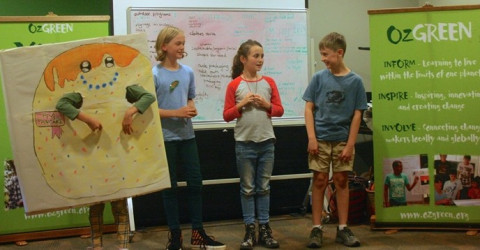
GCED Basic Search Form
Quick Search
You are here
News

'What we do is to unashamedly focus on those people who can bring real change in their communities and the world and help them kindle that flame,' said Sue Lennox, co-founder and former CEO of the Global Rivers Environmental Education Network (OzGREEN) which runs the Youth Leading the World (YLTW) programme.
The YLTW programme, which was nominated for the UNESCO-Japan Prize on Education for Sustainable Development in 2018, uses citizen science, education for sustainable development (ESD) and participatory leadership to inform, involve and connect young changemakers within communities and across the globe so that they can then go on to launch their own tailormade schemes.
'What we like to think of as our trademark is moving people from inaction to a place where they can start imagining and creating a different world,' said Sue. 'We help get them started on that journey. After all they know what change is needed in their own region.'
'What is exciting is that we have proven YLTW to be transferable and have trained over 1000 local facilitators to run the initiative in their own region. Training facilitators online and in person has made YLTW accessible even to people in remote areas globally,' she said.
Three ways to transformative learning
YLTW is based on transformative learning and works in three ways, starting with putting the most up to date environmental information in front of people.
'This is what we call taking the pulse of the planet and all the information we give is grounded in evidence and sound science. Invariably the response from facilitators is that they never realised how serious the global situation was,' said Sue. 'It is a great reality check for those living a privileged life.'
The second stage using strategic questioning involves giving young people the skills to become innovators and shift their communities towards sustainability and fairness.
The third stage is the one most important to young people and that is connecting with others in their own communities and further afield. For Sue the magic of this stage is putting young people from Australia together with people in Bangladesh or Central America or Africa to use the methodology and training to initiate their own projects in very different contexts.
'This brings profound change because often young people feel isolated and this prevents them from stepping up. Connecting with others gets them really excited,' she said.
The YLTW project includes an annual 3-day youth congress run simultaneously in multiple interconnected locations. So far, the project has directly involved over 17,000 youth from around 100 regions globally.
People emerge from the congress with a personal plan to reduce their own eco footprint with targets to meet in bringing about change in their own communities.
'We get them to identify their biggest concerns and then flip that around and help them build a vision. Last year the biggest concerns were climate change and lack of leadership,' said Sue.
Pace of change is quickening
'The rate at which young people fuelled by the seriousness of the situation are stepping up to do something is quickening, as is the coming to life of the global movement,' said Sue who has been working in ESD for more than 30 years. ‘In 2018 we established the YLTW Global Council, made up of experienced Facilitators from around the world. They are guiding the way forward.’
Actions young people choose to put in motion might include getting their schools to go solar by involving staff, parents and student bodies and searching for funding. Or it may be a specific project such as in Canada where young people concerned about the disappearance of bees learned about keeping them and set up a series of hives in public spaces.
Two of the most ambitious projects have involved river health. In partnership with local NGO the Sankat Mochan Foundation, OzGREEN has helped establish a science research centre in Varanasi, India, which works with young local people to improve the health of the sacred River Ganges and the communities worst affected by sewage pollution.
'One of the biggest successes here has been getting young local women involved in a context where that is not the norm. A highlight last year was seeing young village girls stand up and speak passionately about their issues of concerns and what they are going to do about it," said Sue.
Much closer to home in Bellingen where the YLTW project is based, young people have been working with OzGREEN to monitor the health of their local river and report to their local community. In 2015 a major biodiversity tragedy in the local river of the same name, decimated a unique and ancient species of turtles. The turtles were dying in adulthood from a previously unidentified virus.
Working in partnership with conservation organizations and local schools, community volunteers began monitoring the health of the entire river basin on a monthly basis, publishing and sharing their data with the community and the scientists who are leading the recovery of the turtles.
For the future, she believes the key is to build on their strong base making the online facilitator training accessible to more areas of the world. 'We know we have a powerful model for change and that we are able to convey that to the generation that will bring it about,' said Sue.
Education for Sustainable Development (ESD) empowers people with the knowledge, skills, attitudes, values and behaviour needed to think and act for a sustainable future. It is also about including sustainable development issues, such as climate change and biodiversity into teaching and learning. UNESCO promotes ESD at all levels and in all social contexts through its Global Action Programme.
URL:
https://en.unesco.org/news/youth-take-pulse-planet-and-create-change-their-own-communities
